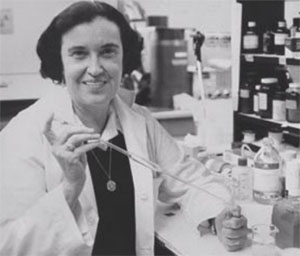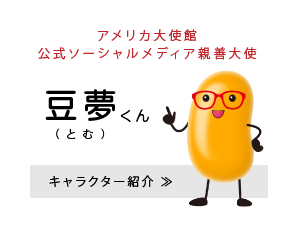国務省出版物
女性実力者の系譜-世界を広げる「ロサリン・サスマン・ヤロウ」

ノーベル生理学・医学賞を受賞した3人の米国人研究者の1人であることを知らされたあとのロサリン・ヤロウ。1977年10月13日、ブロンクス退役軍人病院にて
ノーベル生理学・医学賞受賞者
1921年7月19日生まれ、2011年3月30日死去
ノーベル生理学・医学賞、アルバート・ラスカー基本医学研究賞、米国国家科学賞といった極めて権威ある各賞をはじめ、何十もの賞や名誉学位を受けている。同僚のソロモン・バーソンと共同で、ウィルス、薬品、ホルモンなど人間の体の中にある何百もの物質を測定する技術、放射免役測定法(RIA)を開発した。この発見により、献血の血液の肝炎テスト、ホルモンによる疾患の治療、血液中の異物やガンの検出、そして抗生物質や薬品の効果的な投与量の測定などが可能になった。
ヤロウはニューヨークのブロンクスで生まれ、1941年にハンター・カレッジを成績優秀で卒業したが、当時は女性が物理学者や数学者になることは考えられなかった。しかし、第2次世界大戦で大勢の若い男性が出征したため、彼女はイリノイ大学で物理学の助手になることができた。ヤロウはイリノイ大学物理学部で唯一の女性であり、また1917年以来、同大学で物理を学ぶ最初の女性となった。1943年に学生仲間のアーロン・ヤロウと結婚し、1945年には博士号を取得した。
1947年にヤロウは、ブロンクス退役軍人病院で放射性同位体部門を開設するためにパートタイムで働くことになった。彼女はバーソンと共に放射性同位体を使って、成人発症の糖尿病のメカニズムを研究し、これがRIAの開発につながった。
ヤロウと2人の共同受賞者が1977年のノーベル賞を受賞したが、1972年に死去したバーソンはその中には入っていなかった。ノーベル生理学・医学賞を受賞した女性はヤロウが2人目であり、科学分野のノーベル賞でもわずかに6人目の女性受賞者であった。
ノーベル賞受賞後ヤロウは、著名な先輩であるポーランド生まれの女性物理化学者マリー・キューリーの生涯を描いた5回にわたるテレビドラマ・シリーズのホストを務めた。1979年には、エシバ大学アルバート・アインシュタイン医学校の特別教授となったが、1986年には退職してマウント・サイナイ医学校のソロモン・バーソン記念総合教授となり、1991年に定年退職した。
ヤロウは、科学者として、妻として、また2人の子どもの母親として、仕事と家庭のバランスを取ろうとする中で、自分が女性科学者、女性専門職者として先駆者の役割を果たしていることを常に意識していた。ヤロウは次のように語ったことがある。「出世の階段を上る幸運に恵まれた者は、後に続く人たちの模範となる個人的な責任を自覚しなければならない」そして、ノーベル賞受賞式の晩さん会では、権限を持つ者が女性の可能性を過少評価してはならないとして、「世界が、私たちを悩ませている多くの問題を解決するためには、人口の半数が持つ才能を無駄にしてはならない」と述べた。
*上記の日本語文書は参考のための仮翻訳で、正文は英文です。
Rosalyn Sussman Yalow - Women of Influence
Nobel Prize winner for physiology or medicine
(Born: July 19, 1921)
Nobel Prize for physiology or medicine, Albert Lasker Basic Medical Research Award, and U.S. National Medal of Science: These are the most prominent among scores of prizes and honorary degrees awarded to Rosalyn Yalow in recognition of her achievements. With her colleague Solomon Berson, Yalow devised a technique – radioimmunoassay (RIA) – that measures hundreds of substances in the human body, from viruses to drugs to hormones. Thanks to their discovery, we now can screen blood-donor supplies for hepatitis, treat hormone-related health problems, detect foreign substances and some cancers in the blood, and gauge effective dosage levels of antibiotics and drugs.
When Yalow was born in the Bronx, New York, and then when she graduated with honors from Hunter College in 1941, women were not expected to become physicists or mathematicians. But, with so many young men fighting in World War II, she was offered a teaching assistantship in physics at the University of Illinois. There, Yalow was the only woman in the physics department and the first woman to study physics at that university since 1917. She married a fellow student, Aaron Yalow, in 1943 and received her doctorate in 1945.
In 1947, Yalow agreed to work part-time to start a radioisotope service in the Veteran's Administration Hospital in the Bronx. She and Berson used radioactive isotopes to investigate the mechanism behind adult-onset diabetes, the research that led to RIA.
Yalow and two other joint recipients won the Nobel in 1977, but not Berson, who died in 1972. She was the second woman to win this Nobel, and only the sixth to win any Nobel in the sciences.
After receiving the Nobel, Yalow hosted a five-part dramatic TV series on the life of a famous forerunner, Polish-born physical chemist Marie Curie. In 1979, she became a distinguished professor at the Albert Einstein College of Medicine at Yeshiva University. She left that post to become the Solomon Berson Distinguished Professor-at-Large at the Mt. Sinai School of Medicine in 1986. She retired in 1991.
Throughout her years juggling her work as a scientist, wife, and mother of two children, Yalow was mindful of her standing as a trailblazer for women scientists and professionals. She has said, "Those of us who have had the good fortune to move upward ... must feel a personal responsibility to serve as role models and advisors to ease the path for those who come afterwards." And, in her Nobel Banquet speech, she reminded those in power not to undervalue women's potential. "The world cannot afford the loss of the talents of half of its people if we are to solve the many problems which beset us," she said.
For additional information, see: Nobel Prize
http://nobelprize.org/nobel_prizes/medicine/laureates/1977/




